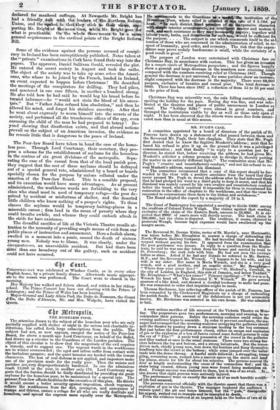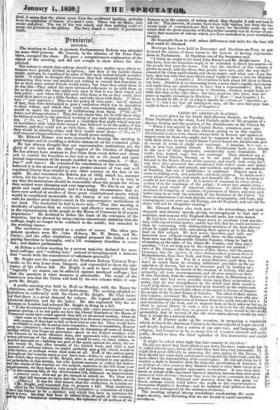MR. PUGH'S CASE.
A committee appointed by a board of directors of the parish of St. Pancras have drawn up a statement of what passed between them and the Reverend Mr. Pugh, their late chaplain. They state that Mr. Pugh first denied that he knew the fugitive Muskett's address ; next that he based -his refusal to give it up on the ground that it was a privileged communication and that finally "in reply to a question put by a director, he stated that, before receiving the address, he had given Mr. Muskett's solicitor a solemn promise not to divulge it, thereby putting the matter in an entirely different light." The committee state that Mr. Pugh's "evasive and unsatisfactory conduct," and not his refusal to re- veal Mnskett's address, caused his dismissal.
" The committee recommend that a copy of this report should be for- warded to the vicar with a positive assurance from the board that they never pressed Mr. Pugh to reveal the address after he had informed them that he had pledged his word to a third party to keep it secret, and that his dismissal was mainly caused by hia own evasive and unsatisfactory conduct before the board, which rendered it impossible for them to recommend his restoration to the office of chaplain to the workhouse, and that the vicar be requested to communicate these facts to the bishop and archdeacon." The Board adopted the report by a majority of 19 to 3.
The Court of Bankruptcy has appointed a meeting to divide 1000/. among the creditors of Colonel Petrie Waugh. The claims against that worthy, exclusive of the claim of the Eastern Bank, amount to 29,000/. It is ex- pected that 20001 of assets more will shortly accrue. The bank claim is 280,0001., but the claim is disputed. The creditors, it seems, objected to prosecute Waugh, because legal expenses would have swallowed up the meagre assets.
The Reverend St. George Kirke, rector of St. Martin's, near Hermetic, was taken before Mr. Broughton to answer a charge of defrauding the North-Western Railway Company. He had travelled third class from Li- verpool without paying his fare. It appeared from the examination that the poor gentleman was insane. In reply to a question from the Magis- trate, he said he was one day taken from his house and carried by train to St. Petersburg; the cook rode with him. He had not seen the carriage before or since. Asked if he had any friends he referred to Mr. Barrow, M.P., and the Reverend Mr. Wrench.. "I happen to be his wife, and his wife is my sister. Her name is Maria Wrench, and she is a very good wench, and a good mother, and an angelic sister." Mr. Broughton- " Where does your sister live ? " Prisoner—" St. Michael's, Cornhill, in the city of London, in England, this side of Jamaica, and below Tuxford." Mr. Broughton—" What's her name?" Prisoner (spelling)—" W-r-e-n-c-h, Wrench his head off. The Reverend T. W. Wrench." He gave several answers of a like kind, and showed a decided tendency to make bad puns. He was remanded in order that inquiries might be made.
Thomas Birchmore, late relieving-officer of the parish of St. Pancras, has been remanded by the Clerkenwell Magistrate on a charge of embezzling the parish funds. The amount of the defalcations is not yet accurately known. Mr. Birchmore was arrested in his own house. He was admitted to bail.
A very serious sacrifice of life occurred at the Victoria Theatre on Mon- day. The proprietors gave two performances, morning and evening, to ac- commodate their patrons. Before the morning audience could retire the evening audience began to assemble. In order to prevent confusion, the ma- nager had arranged that the morning audience occupying the galleries shoule, quit the theatre by passing down a staircase leading to the box entrance But just before the first performance closed, either an escape and explosion of gas or the explosion of a box of fusees caused some foolish persons to raise the cry of "Fire!" A panic took possession of the crowd in the galleries and they rushed at once to the usual staircase. There were two strong bar riers between the top and bottom, and a strong balustrade. But the terror- driven mob, chiefly young men, tore down the bathers and flung themselvei headlong into the crowd at the bottom; while some jumped over the balus- trade into the dense throng. A fearful strife followed; a struggling, trami piing, screaming mass, wedged into a narrow space on the stairs and land mg places, strove for life for about ten minutes. The persons nearest the door at length understanding the cause of the commotion fled ; and th,r stairs being cleared, fifteen young men were found lying motionless an dead. Prompt succour was rendered to them, but it was of no avail. It ;a also known that eight persons were seriously injured.
The performance went on exactly the same as if no such horrible s of life had occurred.
The persons connected officially with the theatre assert that there was A - explosion of gas in the theatre. The manager implored the audience 1 remain quiet ; the pit and boxes listened, but the "gods," disregardin his appeal, rushed out to trample and be trampled to death.
From the evidence tendered at an inquest held on the bodies of two of 111
is
.1







































 Previous page
Previous page